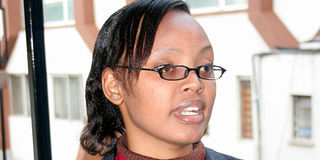Standing strong in the face of cancer

Lucky Ndanu speaks about her condition on Thursday. Photo/MICHAEL MUTE
With her confident gait and exuberant smile, Lucky Ndanu is testimony of a young lady who has dealt with an ailment that has long been associated with old age. At 22, Ndanu was diagnosed with breast cancer and resolved this would not drag her down nor curtail her dreams.
In November, 2007, she started experiencing pain in her right breast and noticed a small lump in the right one. She decided to seek medical attention immediately. After days of agony as she waited for the results, her mother, Regina Nzeki, encouraged her and promised to stand by her whatever the outcome.
Results from her biopsy revealed the tumour was cancerous and the doctors had to remove her breast, which was done last May. The bespectacled woman is celebrating one year since her operation and is happy that she was able to catch the ‘quiet’ disease before it was too late.
She encourages young women to take self breast examinations seriously to catch any symptoms of breast cancer. “Do not ignore any lumps. The earlier the better,” she says wearing a broad smile. Currently she is on a 5-year medication and sees her doctor bi-annually for check-ups.
Ndanu is vibrant and besides wearing an artificial breast everyday she confesses that her social life is normal. She still enjoys her favourite meals and is grateful to a strong network of family and friends.
As an administrative assistant in Hurlingham, she reports to work at 8am and leaves at 5pm everyday. She shares her experiences with young women in churches and schools countrywide. Lucky is a sign of a worrying trend among the medical experts who are seeing breast cancer affecting younger people.
Changed dramatically
“Traditionally the disease has been associated with old age, but this has changed dramatically in the past few years,” says Dr Jotham Micheni, the chief executive officer at Kenyatta National Hospital. Of the 900 new breast cancer cases diagnosed at KNH last year, 360 of them were young women aged between 20 and 35 years.
Even more worrying, Dr Micheni said on Thursday, is the fact that out of 350 cases presented for admission in the same period, more than half of them were at late stages. “Most of the late stage cases are expensive to treat and hardly do they produce the desired results,” said Dr Micheni while receiving a mammography unit – a system for diagnosing breast cancer, donated by a US based organisation, Radiology Mammography International.
The emerging trend where breast cancer is increasingly affecting young women and men has been largely attributed to changing lifestyles — consuming over processed foods, too much alcohol and smoking coupled with heredity traits and now HIV/Aids.
“Aids generally lowers the body immunity making it susceptible to disease challenges including cancers,” explained Dr Henry Wanga, an interventional radiologist. While the cancer burden grows in the country, KNH remains the only public hospital that manages the disease. But according to the director, it is over-stretched, old and requires a total overhaul.
“The unit is due for overhaul, having served the hospital for 20 years,” says Dr Micheni. His observations are in agreement with findings within the larger ministry of health. Recently the Director of Medical Services Dr Francis Kimani, said the government was concerned about the increasing cases of cancer deaths in Kenya.
Dr Kimani said an upsurge of cancer was being reported in Kenya now more than 10 years ago and there has been a significant increase of the disease among younger people. He said the disease killed about 18,000 people in the country in 2005. Cancer ranks third as the cause of death after infections (including HIV) and heart diseases. The disease contributes to 6.5 per cent of all deaths annually.
The World Health Organisation’s International Agency for Research on Cancer (IARC) estimates that about 82,000 new cases of cancer occurred annually in Kenya.
Among men, the three most common cancers are those of the oesophagus (throat), prostate and Kaposi’s sarcoma while in women, breast cancer is the leading cause of death followed by cervical and throat cancer respectively. Medical experts have attributed the drastic change in disease patterns in the country to social and economic changes.




